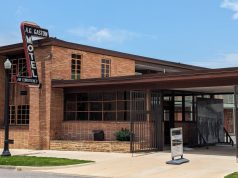 Dr. Barbara Rountree, retired educator from University of Alabama, Greg Hurst and Cathy Wooldridge, both of the Tuscaloosa area schools, were facilitators at the Shades Valley Zone Community meeting October 6. It was the second of six meetings planned across Jefferson County to seek stakeholder information about how to improve the school system. The district is engaged with Dr. Marcia Burke’s company in an ambitious strategic planning process which began in August and will conclude in November.
Dr. Barbara Rountree, retired educator from University of Alabama, Greg Hurst and Cathy Wooldridge, both of the Tuscaloosa area schools, were facilitators at the Shades Valley Zone Community meeting October 6. It was the second of six meetings planned across Jefferson County to seek stakeholder information about how to improve the school system. The district is engaged with Dr. Marcia Burke’s company in an ambitious strategic planning process which began in August and will conclude in November.
Here’s how you can participate:
All Jefferson County residents are encouraged to visit the JefcoEd website at www.jefcoed.com and take the most appropriate relationship that one has with the System. That would be either as a citizen at large, a parent of a JefCoEd student or an employee of the school district. All replies are anonymous and are important for they are feedback from the stakeholders of the school district.
There has been a productive meeting with the 26 mayors involved in the county school system, six community zone meetings which began September 29 and will conclude October 28. A report will go to the board before Thanksgiving.
Jefferson County Receives DOJ Funding to Establish Alabama’s First Day Reporting Center
BIRMINGHAM – The Department of Justice has awarded the Alabama Board of Pardons and Paroles a Second Chance Act grant of $687,176 to establish a Day Reporting Center in Birmingham, announced U.S. Attorney Joyce White Vance and Pardons and Paroles Executive Director Cynthia Dillard.
The Day Reporting Center will deliver services to people on parole from state prisons to help them successfully return to society and reduce the likelihood of Birmingham area probationers committing new crimes.
“This grant demonstrates the Department of Justice’s commitment to helping states that are on the path to curbing criminal recidivism,” Vance said. “The day reporting center will follow best practices that have curtailed the rate at which new crimes are committed by ex-offenders in other areas,” she said. “Jefferson County contributes more inmates to state prisons than any other county in Alabama, so starting here is a strong step in the right direction.”
Since 2010, Vance has worked with state and local agencies and community organizations through the North Alabama Reentry Council to reduce crime by increasing successful reentry outcomes for newly released offenders.
Through the Department of Justice’s Smart on Crime initiative, the department promotes a holistic approach to reducing crime – prevention, enforcement and reentry. Smart on Crime prioritizes crime reduction efforts that are committed to data-driven, evidenced-based methodology, and that are collaborative efforts among all stakeholders. The DRC will collaborate with community-based service providers to improve reentry outcomes for ex-offenders.
The DRC services will include employment options, education, substance abuse rehabilitation, and behavioral training, all which have been proven to increase the chances that an ex-offender will avoid re-offending and returning to prison.
Community-based reentry services, such as DRCs, are effective in reducing criminal recidivism and are more cost-efficient, compared to incarceration. The Birmingham center will be modeled after DRCs in Georgia, where only 7 percent of DRC participants reoffend. Alabama’s current ex-offender recidivism rate is about 35 percent. The projected daily cost of the Birmingham center is a fraction of the $43 a day for each inmate within Alabama’s prison system.
Reentry programs that have proven effective in other states towards reducing crime and prison populations are a topic being reviewed by the Alabama Prison Reform Task Force. Taskforce Chairman, State Sen. Cam Ward, R-Alabaster, said, “Community-based, reentry services are the key component to reducing recidivism in our corrections system. These programs are crucial to the reform efforts under way in Alabama.”
State Sen. Arthur Orr, R-Decatur, a taskforce member, added, “We are appreciative of the Department of Justice’s support to help us reduce recidivism among our inmates under community supervision. The improved supervision measures created by this grant will not only help our prison overcrowding situation in Alabama, but also help newly released individuals get on the right track.”
Congress created the Second Chance Act in 2008. It has received broad bipartisan support within Congress, and from former President George W. Bush and President Barack Obama. The Second Chance Act is the first-of-its-kind legislation that authorizes federal grants to government agencies and nonprofit organizations to provide support strategies and services designed to reduce recidivism by improving outcomes for people returning from prisons, jails and juvenile facilities.
The Second Chance Act is administered by the Office of Justice Programs within the Department of Justice.



